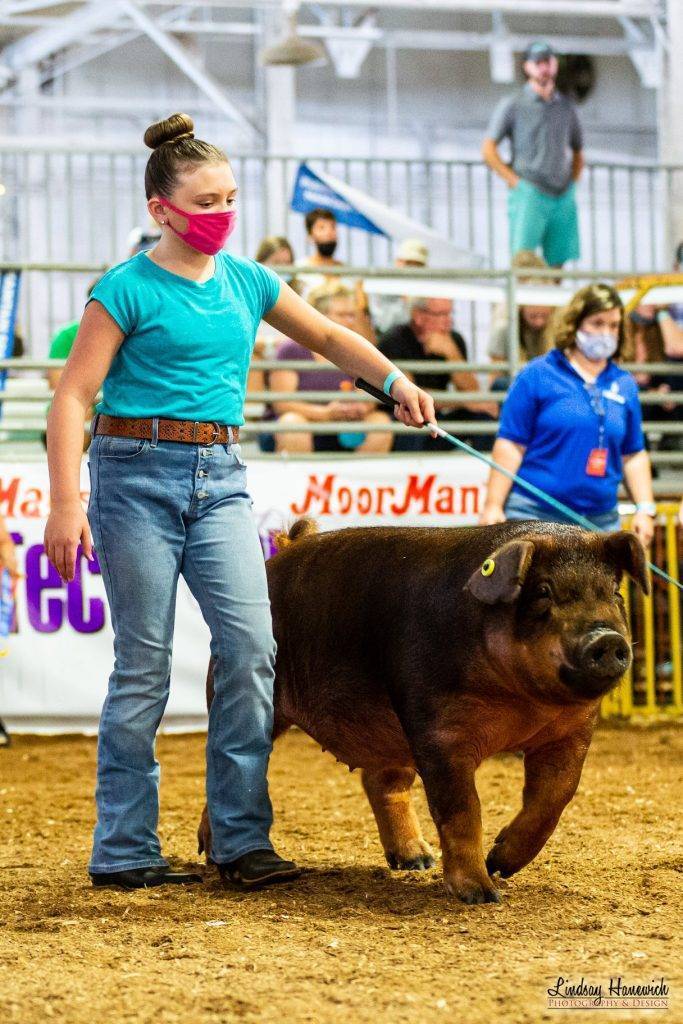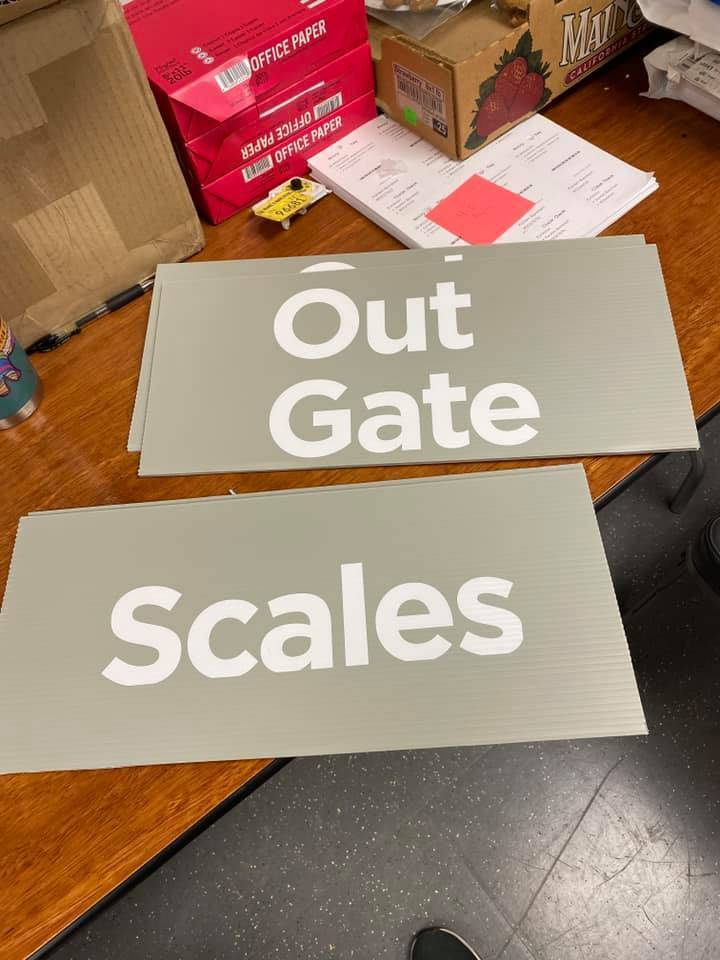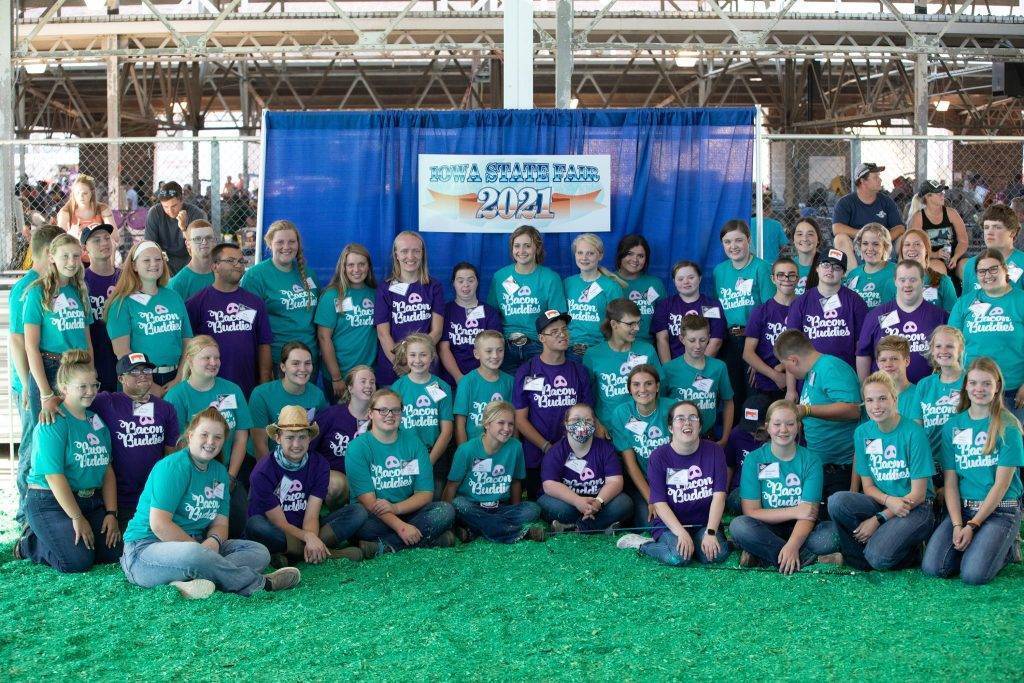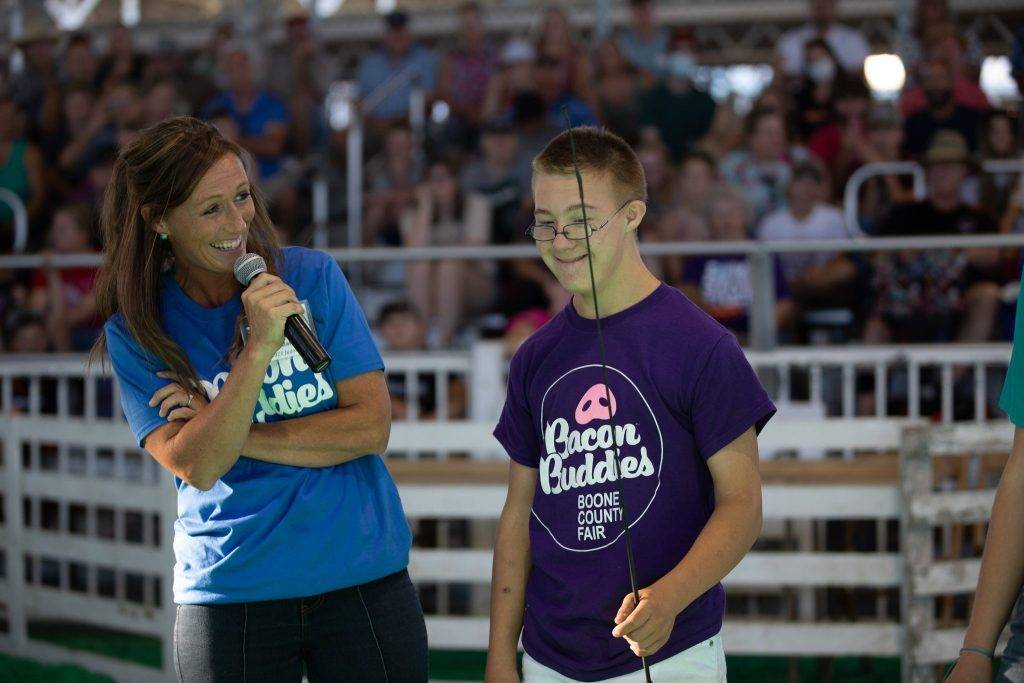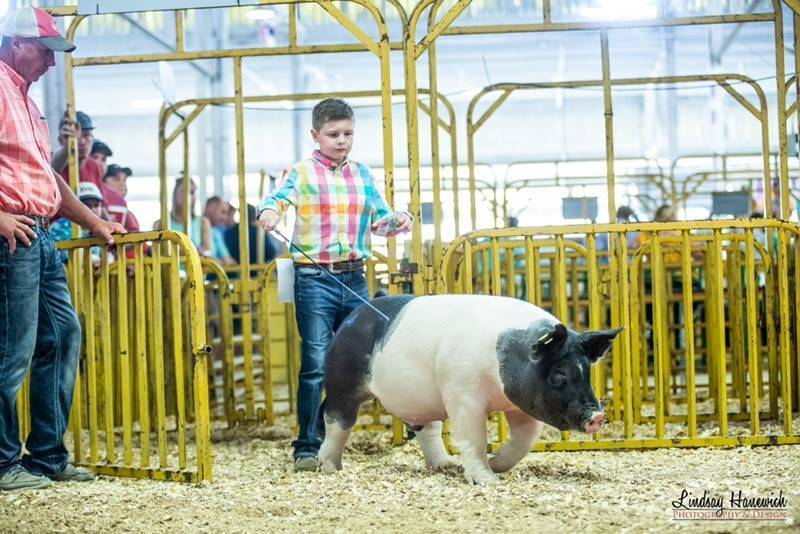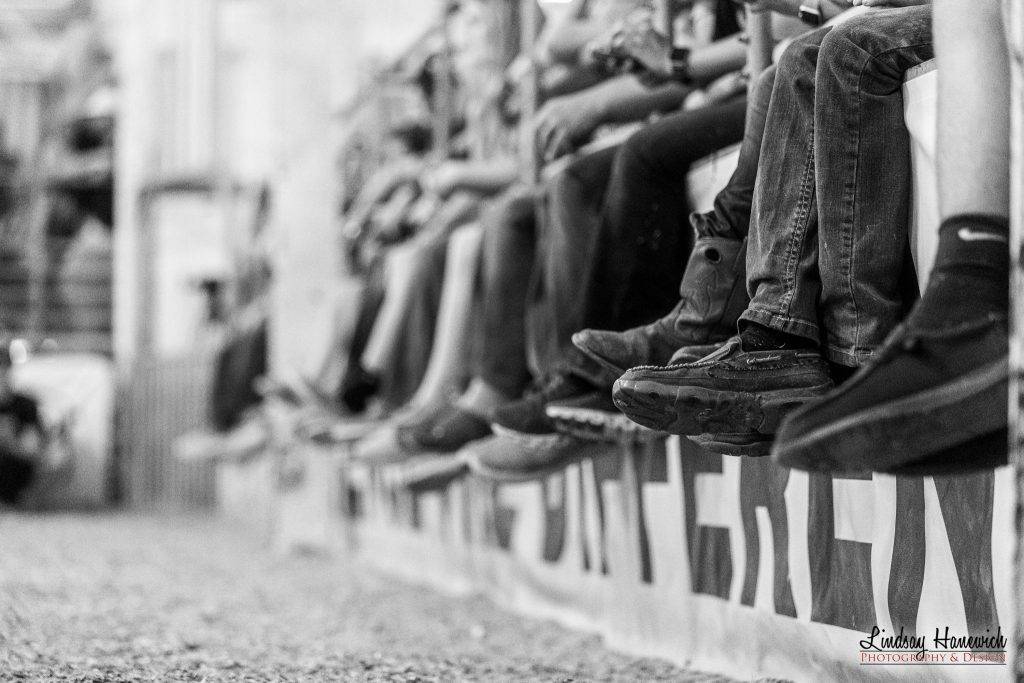
Written by Cassie Godwin
Livestock helps kids thrive. Young people hone work ethic, responsibility, relationships, communication, critical thinking and countless other skills while feeding pigs and cleaning pens. For special-needs youth, the benefits found in livestock projects are tenfold. What happens when caring for show animals brings you peace, but the show ring overwhelms your anxiety and emotions? The Seedstock EDGE Media team spoke with volunteers in two different programs whose goal is to ensure the show ring is for everyone.
Home. The word itself brings to mind a specific place and often evokes a sense of calm and peace. For youth with special needs, livestock and animals often bring that sense of home. However, livestock projects are meant to be exhibited. When a child lives with a disability, stepping into the show ring can trigger a sensory overload, feelings of entrapment and overwhelming information. The Indiana State Fair Special Assistance Liaison Program and Iowa Pork Producers Association Bacon Buddies® Program are two very different programs, yet they both help special-needs youth feel at home in the show ring.
SPECIAL ASSISTANCE LIAISON PROGRAM
Molly Arnold and her husband, Brian, grew up showing pigs. They knew that when they had children, their kids would show pigs. The couple has two sons, Reece and Dawson. Reece is a second-year Indiana 4-H member and on the autism spectrum. From the moment Reece stepped into a pig barn, it was a perfect match.
“When he is in the barn, he is at peace, he is at home. That’s his happy place,” Molly explained. “He doesn’t have any expectations, and the pigs don’t expect anything from him. They don’t expect him to make eye contact, hold a conversation or anything. It’s very therapeutic for him. But it never occurred to me or Brian before we had Reece that we would have a child who would feel so at home with livestock yet feel so out of place in a show ring.”
Early on in Reece’s childhood, Brian and Molly realized the amount of sensory input found in the show ring. Stepping into the ring would require a lot from Reece. The Arnolds didn’t push Reece into the ring. Instead, the couple waited for him to tell them he was ready and wanted to give showing a try.
“We were never going to push it because we know that [the show ring] is not really set up right now to be inclusive for Reece and kids like him,” Molly said. “But making it inclusive is an easy change. We just don’t think about it because the show ring has always been the way it’s always been.”
Two years ago, Reece told his parents he wanted to give showing a try. After his first time inside the show ring, Molly talked to him about the experience. Molly remembers Reece telling her that if the show ring will always be the way it was that day, then he didn’t want to show again. Molly and Reece talked through different parts of the exhibition process, and he let her know what could be done to make it better.
“For Reece, if he sees that there are people around him that see the struggle, and don’t judge him for it, then he feels like he too is at home in the show ring,” Molly explained. “Reece may not get it all right, he may still get confused and flustered, but he still feels like he belongs. And that is the most important thing. The sense of pride that these kids get whenever they come out of that ring is just unbelievable.”
Reece and his stock show friends, Bailey Furrer and Hogan Hendrickson, ultimately started the Special Assistance Liaison Program. This 2-year-old program was used at the 2020 and 2021 Indiana State Fair. Bailey is a third-year 4-H member, who experienced a similar show ring experience as Reece at her first Indiana State Fair. Molly knew changes needed to be made, approached the Indiana State Fair with ideas and the initiative to start a volunteer-led pilot program. For the first year the Special Assistance Liaison Program concentrated on the Indiana State Fair Swine Barn, but momentum quickly built. A few individuals from the Sheep Barn helped Molly by volunteering during the Swine Show. The volunteers quickly realized that this assistance was also needed in the Sheep Barn and implemented the program for the 2021 Indiana State Fair Sheep Show. With the program in the early stages of development, structures and set standards are still being established. Molly and fellow program volunteers are a wealth of knowledge on tangible ways shows can reduce anxiety and provide an inclusive environment for children who have any type of special need — including young people who are disabled, neurodivergent or need medical assistance. Molly is at the helm of the program and says she won’t stop until it is implemented on all levels. To get involved, simply reach out directly to Molly, and she will put you to work.
The changes the Special Assistance Liaison Program implemented during the Indiana State Fair have been simple fixes with a huge impact. “I never considered it before, but once the problems these kids face was brought to my attention, I realized the show ring is a lot. It really is, but it doesn’t have to be.”
These changes include show additions such as a dedicated person in the show ring who serves as a liaison. The exhibitor gets to know this liaison prior to entering the show ring. The liaison serves as a safe place for the exhibitor in case they need help. Volunteers also added a differentiating feature to exhibitors’ numbers so show judges know if an exhibitor has special needs and will need to be communicated with using verbal cues rather than hand gestures. When special-needs youth are in new places, they often have feelings of being trapped. Posting signage clearly labeling in and out gates, and where the scales are located alleviates those anxieties.
While the program is intended to benefit special-needs exhibitors, the parents also experience a more positive show-day experience.
“As a parent with a special-needs child, you sometimes don’t get to be a parent,” Molly explained. “You’re scared half to death because you just sent your child out there with an animal, and neither you nor the child have any control over the situation. You have no way to fix it if things go bad. The liaison helps mitigate that, allowing the parent to be the parent and the child to be like any other showman.”
Until people are made aware of the show-ring struggles special-needs youth experience, it’s hard to grasp how overwhelming exhibiting livestock can be for them. But while the show ring can pose certain challenges, it is truly rewarding for these exhibitors.
“Livestock is meant for kids with special needs,” Molly said. “Working with livestock is every form of therapy. You have fine-motor skills, course-motor skills, communication, eye contact, routines, listening, the ability to learn, the ability to anticipate and occupational therapy. You also have the mental health aspect. Just being with an animal is very therapeutic. But currently showing is not, and that’s the hardest part about the whole thing.”
By Molly having conversations with Reece, Bailey and Hogan, the issues can then be known and addressed. “Once we know better, we can do better,” Molly stated. “After the first year, we tweaked things and have continued to do so. We have worked to make the changes more streamlined, more available and to fit the needs better. It’s still a work in progress but if we can get as many kids as we can — kids like Reece, Bailey, and Hogan — that are willing to help us, we can keep doing better.”
BACON BUDDIES® PROGRAM
In 2019 Iowa Pork Producers Association partnered with the Iowa Special Olympics to host Bacon Buddies®. This program pairs selected Iowa 4-H and FFA exhibitors (mentors) with Special Athletes (mentees) and allows the young people to spend a day together at the Iowa State Fair learning about pigs, experiencing the show ring and making new friends. Due to the COVID-19 pandemic, Bacon Buddies® was not part of the 2020 Iowa State Fair, but the program returned in 2021with approximately 20 mentees, 40 mentors and multiple volunteers. Jarrod and Shari Bakker are Iowa-based pig farmers, state fair exhibitors and Bacon Buddies® volunteers.
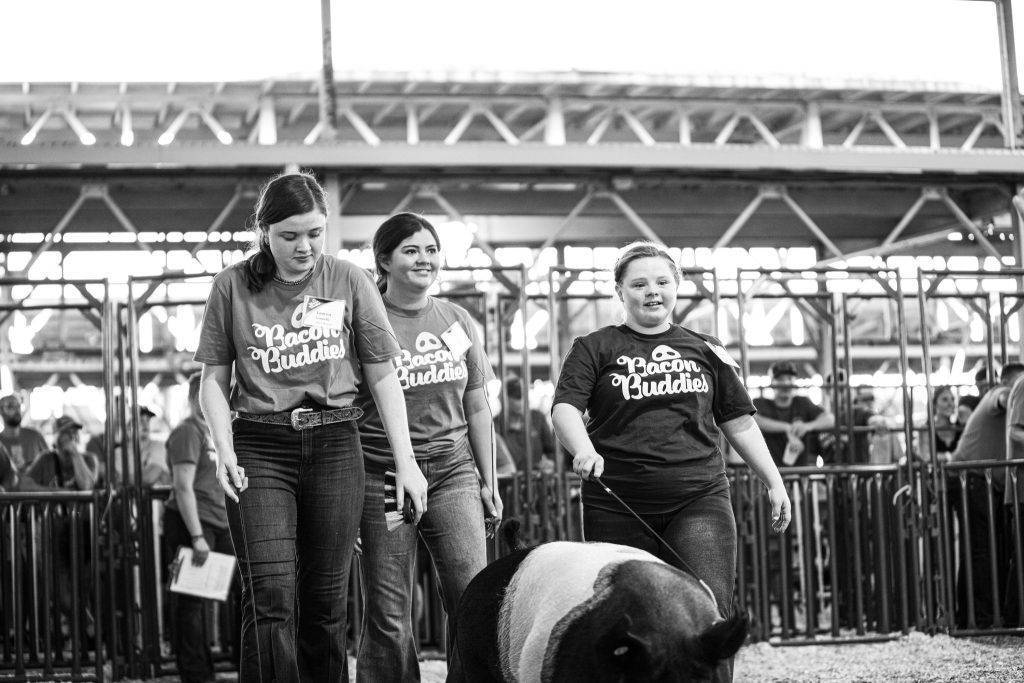
“My husband, Jarrod, and I got to be the ‘judges’ for the event,” Shari said. “We visited with the mentors and the mentees ahead of and during the show and worked with all the participants. Our son, Caeden, got to be one of the mentors this year, as well.”
The 4-H and FFA exhibitors who serve as mentors must go through an application and interview process to be involved with the program. Each Bacon Buddies® was teamed up with two mentors. The each mentee used one of the mentors’ pigs.
The mentors and mentees started the day by meeting in the show ring and getting to know each other. Then the mentors took their Bacon Buddies® to their pig pens. They all worked together to wash, feed and brush the pigs, before relaxing at the tack pens, eating snacks and having fun.
Shari remembered walking through the barns and observing the mentors and mentees interacting together. “It was just really amazing,” Shari recalled. “Kids from 10 to 21 years old who were the mentors were working with their Special Olympic Athletes. That was something truly humbling for those kids [mentors]. They got to take it back to the basics. So often we get caught up in all the cool things we do and the different experiences, and we forget about the basics. We forget about just spraying a pig down, brushing or taking it to the wash rack. With the Special Athletes, it was fun to get to see their reactions on what showing a pig was like.”
The mentors are invaluable to the Bacon Buddies® Program. It is important to have a group of mentors who are comfortable interacting with new people and teaching the Special Athletes what they do with their pigs. “In the livestock industry, we raise kids who are born to be leaders,” Shari said. “I think taking some of those kids and giving them the space to teach and be leaders was a big part of it, too.
Some of the Special Athletes had participated in 2019 and others were brand new and had never been around livestock. The mentors took it really slow and showed the mentees how to work with the animals and get comfortable with the pigs. The mentees learned about the brushes, pig whips and supplies.”
The environment and atmosphere are equally important to the quality of the program. Iowa Pork set up an entrance and exit area where they had countless spectators cheering and providing words of encouragement. The show ring is a big space, and the mentees are showing an animal they have not been around until that day. Making the Bacon Buddies® mentees feel comfortable and encouraged is a significant part of the experience.
“The Special Athletes were not shy at all, and they loved it,” Shari laughed. “We had microphones and were asking them questions. They loved telling us what they thought about pigs and their experience.”
Shari highly recommends for others to volunteer and participate in the Bacon Buddies® program. Information and resources are available on website for Iowa Pork Producers Association, iowapork.org.
The Bacon Buddies® program allows Iowa 4-H and FFA exhibitors the opportunity to share the story of pig farming and teach special-needs youth about livestock. This program provides Special Athletes a space to learn and experience an industry that is full of opportunities available to them. “For me, Bacon Buddies® is a chance to sit back and appreciate the industry we are growing our kids in,” Shari explained. “For sports there is a level of talent you must have to make it in a professional sport, but raising and showing livestock can be for everyone. Anybody can go out, dedicate themselves, work hard and try showing livestock. It’s a perfect opportunity to include as many people as we can and share the story of agriculture.”
THE FUTURE
Both the Bacon Buddies® Program and Special Assistance Liaison Program are in their infancy stages, but the programs will only continue to grow and strengthen. Showing livestock impacts the lives of tens of thousands of young people each year. With these programs kids with any capabilities can feel at home in the show ring and grow into thriving individuals.
“You never, know what kid could be in the ring,” Molly said. “You might have a future Temple Grandin. If the show ring is not conducive for everyone, you never know who you’re excluding. Different is just different. Different doesn’t mean broken. The hardest part is that you get one chance. These kids give it everything they have, and we have that one chance to get it right. Are we going to ignore the problems, or are we going to change and let these kids thrive? Showing livestock can change the entire trajectory of their life. These kids can have a wonderful experience, thrive and contribute to this industry more than anyone could ever imagine. It just amazes me what these kids can do.”
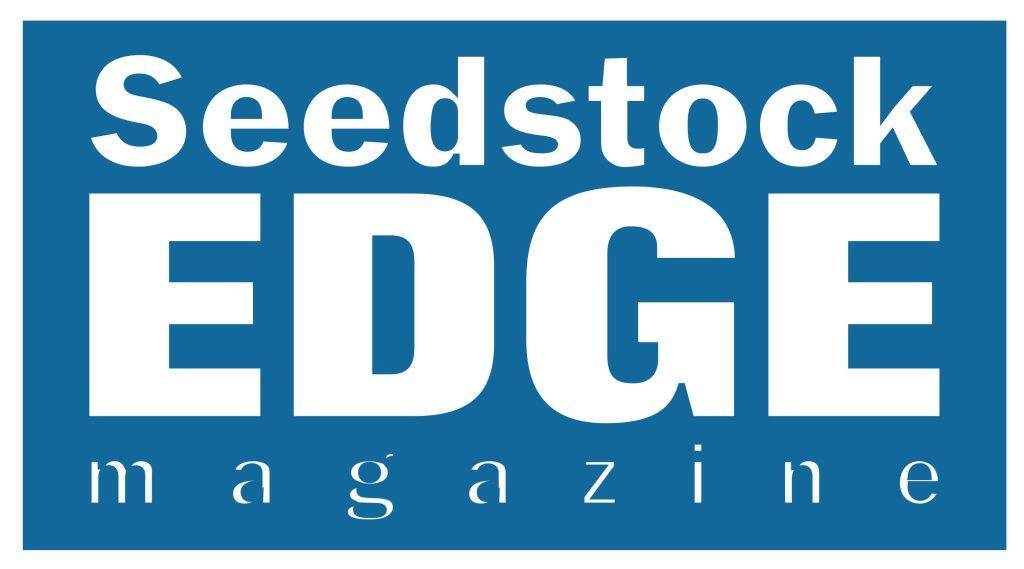
Read this story and more in the January/February/March Seedstock EDGE Magazine. To view now click here!


